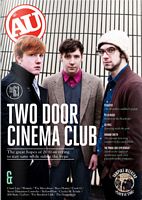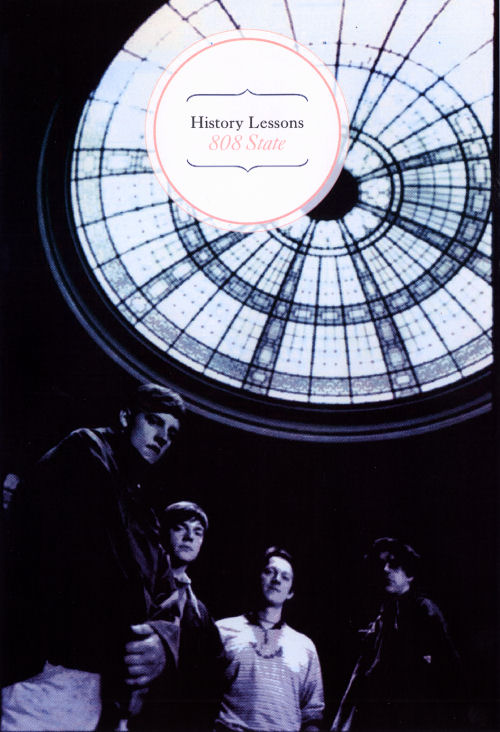| History Lessons: 808 State | |
 |
Alternative Ulster Issue 63 February 2010 Page ?? |
 Be it the gorgeous, saxophone-led chill-out anthem 'Pacific State', or the juddering techno slam of 'Cubik', 808 State's vision and desire to experiment produced some mind-bending music in the late Eighties. As ZTT prepares to release four remastered 808 State albums (Ninety, Ex:El, Gorgeous and Don Solaris) next month, AU talks to head honcho Graham Massey about how a café, a record shop, the rise of ecstasy and a love of jazz pushed back the boundaries of dance music forever. The original 808 State line up comprised Martin Price, the Svengali-like owner of Manchester's Eastern Bloc record shop, Graham Massey and Gerald Simpson, who would later release the classic 'Voodoo Ray' as A Guy Called Gerald. "I used to run a café across the road from Eastern Bloc, and Martin used to come in for cups of tea," Graham tells AU. "We had a record player in there and stacks of vinyl – the records would be covered in coleslaw! Martin used to bring a lot of hip-hop people in, as he wanted to start a label. One of the kids who came in the shop was Gerald." As they became friends, their diverse musical tastes would ultimately shape the sound of the fledgling band – Massey was the electronics geek, Price the Northern Soul fan, and Simpson the expert on the evolving American house scene. "I got really into the recording studio aspects, and I signed up for a recording course. It was the dawn of samplers and computers, so I was learning all that stuff." And of course, Eastern Bloc provided an endless supply of new, imported music. 808 State were christened after Simpson 's favourite drum machine, the Roland TR-808, but Graham prefers to reflect on the impact of their name. "It sounds very corporate and faceless, and we liked that. We weren't setting out to be pin-up pop stars – it was music for the people." The trio became heavily involved Manchester's club scene, spending night after night at the Hacienda, and the lesser-known but more, as Graham describes, "chemical" Thunderdome. In the mid-Eighties, different musical genres were beginning to collide. "There was electronic soul, like The SOS Band, and then there was house, which wasn't considered very cool. British electronic music, like New Order and Throbbing Gristle, was more our territory, but then the territories starting crossing. That's when it got interesting to us – if we took these sounds and then manipulated them into our view of things. Make them harder, make them weirder." After releasing the acid-house Newbuild in 1988, the band came to public prominence with the majestic 'Pacific State' single a year later. Containing the now seminal saxophone melody and awash with tropical electronica, the song became a blueprint for what was to become known as ambient house. Today it still sounds disconcertingly groundbreaking and represented the summation of the band's influences. "There were quite a lot of jazz influences in what we were doing, like to put a soprano saxophone on 'Pacific State'. When you get a record like 'Pacific State', it's not just come from the house scene – it's come from Santana records, from [jazz fusion pioneers] Weather Report, [original house music guru] Marshall Jefferson and ['father of exotica'] Martin Denny." The usually conservative Gary Davies played 'Pacific State' daily on BBC Radio 1, and for the public at large the genie was out of the bottle. "John Peel played us and that was very helpful, but not nearly as helpful as daytime [radio]. Davies was very mainstream, but I'm sure all those Radio 1 DJs got up to all kinds! He probably had an epiphany to that record." The drug scene played a part in shaping the sound of 808 State. As ecstasy became the drug of choice, chill-out rooms became integral to a night of dancing. Graham agrees that 808 State created music specifically with this in mind. "The types of music that was being played in clubs, and the barriers that were broken down, were definitely influenced by the drugs. When ecstasy took off, the demand for different types of house music did get bigger. There were certain key records at raves that had that three-in-themorning atmospherics that we were very interested in." And 808 State were not merely musical innovators, with their importance lost to only the geekiest of electronicaheads. At their height, they were a hugely successful band and highly sought after as both remixers and collaborators, working with a pre-solo career Björk and Mancunian rapper MC Tunes. "We did the G-MEX in Manchester, which was a 12,000 seater. We were a faceless dance act and that kind of thing didn't happen. We were in at the deep end; we just assembled the hugest PA system ever!" And as for Ms. Gudmundsdóttir? "She had our early stuff like Newbuild andQuadrastate, and wanted us to get involved in programming beats that would become Debut. She rang up, and didn't say who she was, but said she was from Reykjavik so we sussed her. We did those two tracks on Ex: El; 'Qmart' was a first take improvisation – it's quite jazz." Massey would go on to produce Björk's magical Debut album. The success of 'Pacific State' led to a record deal with ZTT, and 808 State became one of the posse of bands, such as The KLF ("We'd spend weekends in the weird KLF house; they had an actual police car in there!) destined to bend and stretch dance music for the mainstream. "With [1989's] Ninety, we had signed to ZIT and did the whole thing in not much more than a fortnight. We didn't fuss over it; it's got the heat of the moment in it. It's got some experimental stuff on it and it became an 'after club' kind of record. There became a new space within rave music, which us and people like The Orb looked to fill." Massey seems particularly proud of the legacy 808 State has left, and is excited by the torch of innovation being carried forward by artists like Autechre, Aphex Twin, Simian Mobile Disco and even the currently red-hot Delphic. "With the Autechre connection, we don't sound anything like them – but they wouldn't sound anything like they do if we hadn't kick started that experimental area. And I've had many conversations with [Aphex Twin] Richard James about the 'Massagarama' single appearing in a record shop in Cornwall and kick starting a little scene down there." 808 State still tour, but logistics are likely to get in the way of any new material. "Over the last two years we've done a clump of summer festivals, and we still get on. That's an achievement really. Artistically, we could record again, but to untangle our lives to do it would be quite hard." And does Massey have any regrets? "No, but we would have killed to have the technology we've got now. It's now so much easier due to how much sample you can get on your modern computer, compared to the floppy disk we were building things on. You'd get one-and-a-half seconds of sample on a disk – a song would be made up of tiny fragments, like a mosaic." And what would 808 State's epitaph be? Graham grins at AU, and without missing a beat, concludes, "Door kickers!" NINETY, EX:EL, GORGEOUS AND DON SOLARIS ARE OUT ON MARCH 22 VIA ZTT RECORDS. WWW.808STATE.COM |
|
808 STATE'S KEY TRACKS, AS CHOSEN BY GRAHAM MASSEY 'Pacific State' (from Quadrastate,1989). 'Cubik' (from Ex: El, 1991). 'In Yer Face'
(from Ex: El, 1991). 'Nephatiti'
(from Ex: El, 1991). 'Techno Bell' (from Ex:El, 1991). |
|
BANDS THAT SHARE THE SAME MUSICAL DNA AS 808 STATE Herbie Hancock Now approaching 70, the legendary acid-jazz pianist was an early embracer of synthesizers; 1983's global smash hit 'Rockit' featured scratching and drum machines. The Future Sound Of London Forever pushing back the boundaries of experimental dance music, FSOL shared the same studio as 808 State in the late Eighties. According to Massey, "They took an extreme angle of what you could do with rave music." Björk Once an indie-guitar girl with The Sugarcubes, a fascination for rhythms and samples was fuelled via collaboration with 808 State. Autechre Rochdale's finest, the Warp Records alumni are paid-up devotees. "Our Newbuild album did set a lot of people off in a certain direction. Autechre are massive fans of our really early acid stuff." Simian Mobile Disco SMD's James Ford drummed for 808 State, and was hugely influenced by their organic, analogue approach or, as Massey describes, "a direct lineage between one generation of club culture and the next." |
|